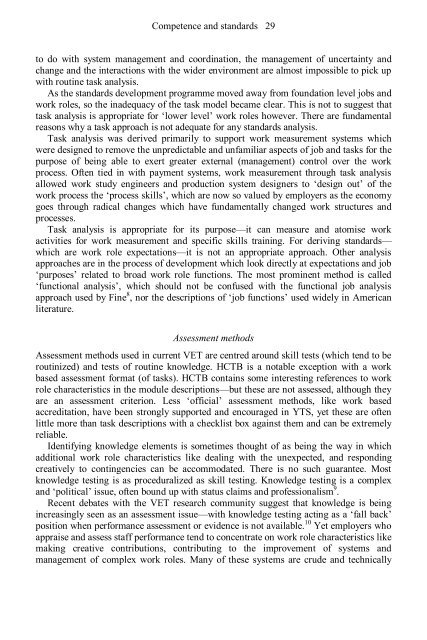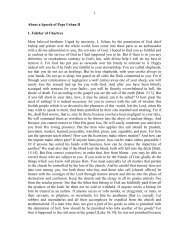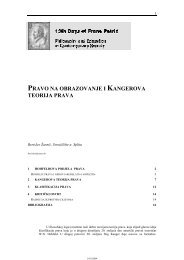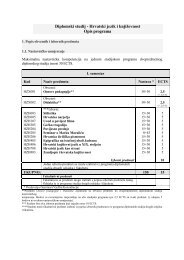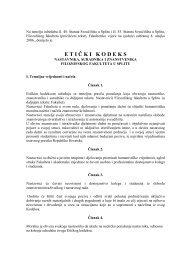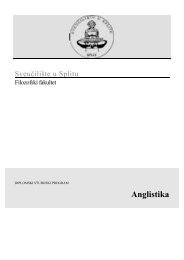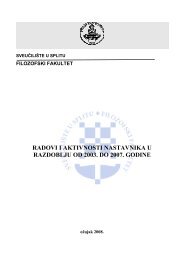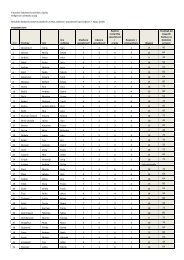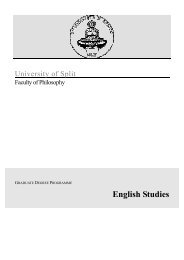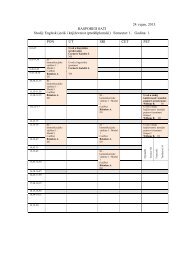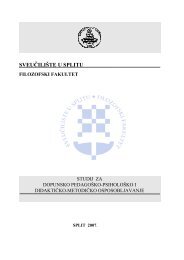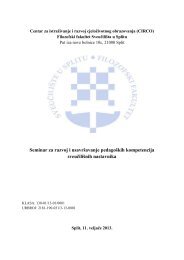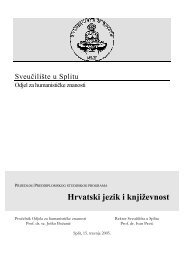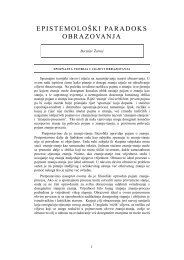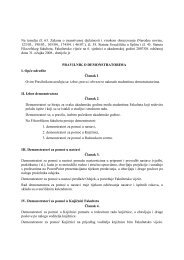Competency Based Education and Training
Competency Based Education and Training
Competency Based Education and Training
Create successful ePaper yourself
Turn your PDF publications into a flip-book with our unique Google optimized e-Paper software.
Competence <strong>and</strong> st<strong>and</strong>ards 29<br />
to do with system management <strong>and</strong> coordination, the management of uncertainty <strong>and</strong><br />
change <strong>and</strong> the interactions with the wider environment are almost impossible to pick up<br />
with routine task analysis.<br />
As the st<strong>and</strong>ards development programme moved away from foundation level jobs <strong>and</strong><br />
work roles, so the inadequacy of the task model became clear. This is not to suggest that<br />
task analysis is appropriate for ‘lower level’ work roles however. There are fundamental<br />
reasons why a task approach is not adequate for any st<strong>and</strong>ards analysis.<br />
Task analysis was derived primarily to support work measurement systems which<br />
were designed to remove the unpredictable <strong>and</strong> unfamiliar aspects of job <strong>and</strong> tasks for the<br />
purpose of being able to exert greater external (management) control over the work<br />
process. Often tied in with payment systems, work measurement through task analysis<br />
allowed work study engineers <strong>and</strong> production system designers to ‘design out’ of the<br />
work process the ‘process skills’, which are now so valued by employers as the economy<br />
goes through radical changes which have fundamentally changed work structures <strong>and</strong><br />
processes.<br />
Task analysis is appropriate for its purpose—it can measure <strong>and</strong> atomise work<br />
activities for work measurement <strong>and</strong> specific skills training. For deriving st<strong>and</strong>ards—<br />
which are work role expectations—it is not an appropriate approach. Other analysis<br />
approaches are in the process of development which look directly at expectations <strong>and</strong> job<br />
‘purposes’ related to broad work role functions. The most prominent method is called<br />
‘functional analysis’, which should not be confused with the functional job analysis<br />
approach used by Fine 8 , nor the descriptions of ‘job functions’ used widely in American<br />
literature.<br />
Assessment methods<br />
Assessment methods used in current VET are centred around skill tests (which tend to be<br />
routinized) <strong>and</strong> tests of routine knowledge. HCTB is a notable exception with a work<br />
based assessment format (of tasks). HCTB contains some interesting references to work<br />
role characteristics in the module descriptions—but these are not assessed, although they<br />
are an assessment criterion. Less ‘official’ assessment methods, like work based<br />
accreditation, have been strongly supported <strong>and</strong> encouraged in YTS, yet these are often<br />
little more than task descriptions with a checklist box against them <strong>and</strong> can be extremely<br />
reliable.<br />
Identifying knowledge elements is sometimes thought of as being the way in which<br />
additional work role characteristics like dealing with the unexpected, <strong>and</strong> responding<br />
creatively to contingencies can be accommodated. There is no such guarantee. Most<br />
knowledge testing is as proceduralized as skill testing. Knowledge testing is a complex<br />
<strong>and</strong> ‘political’ issue, often bound up with status claims <strong>and</strong> professionalism 9 .<br />
Recent debates with the VET research community suggest that knowledge is being<br />
increasingly seen as an assessment issue—with knowledge testing acting as a ‘fall back’<br />
position when performance assessment or evidence is not available. 10 Yet employers who<br />
appraise <strong>and</strong> assess staff performance tend to concentrate on work role characteristics like<br />
making creative contributions, contributing to the improvement of systems <strong>and</strong><br />
management of complex work roles. Many of these systems are crude <strong>and</strong> technically


